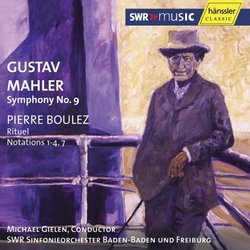The pinnacle in Gielen's Mahler cycle, a Ninth touched by in
Santa Fe Listener | Santa Fe, NM USA | 10/30/2008
(5 out of 5 stars)
"I have been as guilty as anyone in hauling out the same adjectives for Michael Gielen -- cool, objective, modernist, analytical -- but I've tried to temper my knee-jerk reflex by noting whenever he displays what is best in his Mahler: real ideas, personal feeling, a flexible beat, and a borad conception. The best certainly comes out in this Ninth Sym.,, and perhaps it's no coincidence that Gielen was relatively young (67) when he made the recording in 1994.
Because he enters the field with a second-tier radio orchestra situated in Baden-Baden, Gielen needs a strong conception to compete with the likes of the Berlin and Vienna Phil., not to mention that the Ninth has received many great readings(from Bernstein, Levine, Bruno Walter, Abbado, Barbirolli, and Karajan, just to mention some personal favorites). To my amazement, really, Gielen stands up to the best in strength, vision, and ability to handle Mahler's most complex technical writing. In fact, he's so inspired that the SWR SO musicians rise far higher in their execution than in any other installment in Gielen's Mahler cycle.
The litmus test in the Ninth is the first movement, where every detail of tempo, balance, and contrasted moods is tricky. But also, this music is as wrenching as any ever written, and so the more overwhelming your conception, the more successful you will be. Gielen is as overwhelming as Bernstein, which gives you the measure of the controlled chaos that he rules over. I was immensely moved.
Pointing to the satirical element in the clomping Scherzo, Simon Rattle said that this movement represents everything Mahler hated about the country, while the Rondo-Burleske that follows stands for everything he hated about the city. Gielen isn't satirical at all, however, but almost staid, as deliberate as Klemperer if not as poker-faced. Happily, he rings many changes of mood and timbre, giving us a valid alternative to the mockery that this music implies. The Rondo-Burleske has a strong through-line (as does the first movement), which keeps it from getting scrambled up in corss-talk and counterpoint. Other conductors take the opposite course, assuming that Mahler wanted the effect of arguing voices fighting to be heard over each other, but Gielen's more controlled approach seems just as valid, if less manic than, say, the demonic Bernstein and Levine. Inexplicabl, there are several minutes of lackluster noodling before the final climax.
The concluding Adagio is one of the absolute pinnacles in Mahler and demands utmost concentration and focus. It wasn't encouraging that Gielen changes Mahler's instruction of "very slow" to merely "slow," but it's not his way to wrench emotion from the listener. As in the great final Adagio to the Third Sym., Gielen saves himself with an instinctive grasp for long, arching lines. His conception here, which I've never encountered before, is to start out in a relaxed mood, build steadily with a lithe, quick-moving line, reaching a point of maximum intensity, after which the extended farewell, often agonizing in its heartbreaking hush, remains equally lithe and almost nimble. Does it work? Well, Gielen shifts the emotional ground away from tragedy, and in purely musical terms he doesn't falter for a single measure. As one is compelled to say in several other movements, Gielen has thought of a valid alternative.
Many buyers will resist a two-disc Mahler Ninth, so laying out extra money may depend on how you feel about Boulez's 'Notations' and 'Rituel' in memory of the Italian-German composer-conductor Bruno Maderna, who died young in 1973 at the age of 53 (and who was a highly indidivual interpreter of the Mahelr Ninth -- is that the link here?). I find the transiton to mid-century atonalism jarring. It's a cliche to say that the Mahler Ninth harmonically pointed to the future. If that's true, it wasn't this future he had in mind. Gielen's performance seems to be all that it should be in terms of clarity and atmosphere.
"


 Track Listings (3) - Disc #1
Track Listings (3) - Disc #1